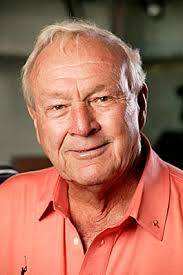On September 26, Golf Hall of Famer and seven-time major winner Arnold Palmer passed away at his home in Pittsburgh. Widely regarded as one of the greatest golfers of all time, Palmer is also famous for his signature drink, half iced tea and half lemonade, which was eventually named after him. Though his contributions to the world of golf are significant, even more notable is his legacy as the athlete who paved the way for sports marketing.
Today it is certainly the norm, if not the expectation, that athletes receive sponsorships from various companies in order to advertise the products of those companies. This is why you see people like Roger Federer playing tennis while wearing a Rolex watch, or retired basketball player Shaquille O’Neal talking about the benefits of Icy Hot on TV.
However, ba ck in the 1950’s and 60’s, it was practically unheard of for companies to pay sports stars to advertise their products. Palmer and his business manager Mark McCormack, later a renowned marketing agent and founder of IMG, revolutionized the way athletes made money by striking advertising deals with a variety of companies. Early in his career, Palmer signed his name to organizations such as Qantas Airlines, Holiday Inn, and Bolens tractors.
ck in the 1950’s and 60’s, it was practically unheard of for companies to pay sports stars to advertise their products. Palmer and his business manager Mark McCormack, later a renowned marketing agent and founder of IMG, revolutionized the way athletes made money by striking advertising deals with a variety of companies. Early in his career, Palmer signed his name to organizations such as Qantas Airlines, Holiday Inn, and Bolens tractors.
However, Palmer didn’t settle for just those partnerships. Companies found him to be an immense asset because of his popularity, charm, and easy wit, and Palmer soon upgraded to bigger and better sponsorship deals. He later dropped Qantas for United Airlines, upgraded from Holiday Inn and Bolens to Westin and Ford Motor Co. He also signed deals with Cadillac, Rolex, Hertz, Pennzoil, and E-Z-Go Golf Carts.
In this way, Palmer was able to establish a brand marketing empire, and continued to make money from his deals long after he retired from playing golf. He created his own professional golf tournament in Florida, the Arnold Palmer Invitational, and also helped to design over 300 courses across the country. He was so celebrated and well-liked by the public, that Palmer is also credited with popularizing golf as a TV sport.
His entrepreneurial spirit and marketing skill left behind a legacy from which today’s sports stars are reaping the benefits. Never before had people thought to create partnerships between athletes and companies, and Palmer was one of the first to forge these mutually beneficial relationships that we take for granted today. Sports sponsorship expert Nigel Currie says of Palmer, “He was the prototype for all of today’s high earning sports men and women, and one of the few people you can truly say changed the world of sports business.”








